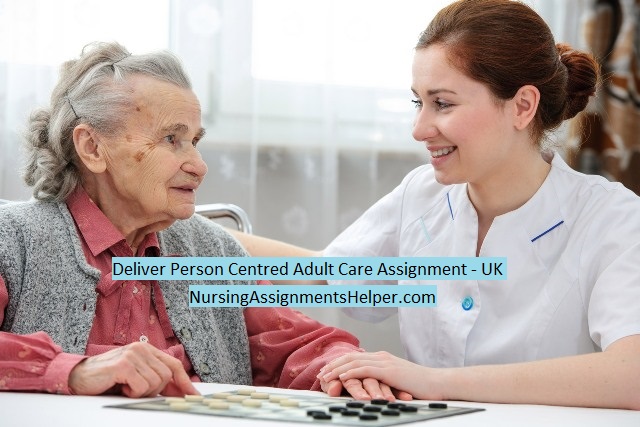Deliver Person Centred Adult Care
Description of Task
Questions and answers
Scope of Task
The following areas are to be covered / discussed / referred to in your answers:
~ Understanding the importance of person centred care and how this is delivered.
~ Holistic approaches to delivering better outcomes.
~ Understanding whistle blowing.
Deliver Person Centred Adult Care

Values:
Equality
Care
Diversity
Core Skills:
Literacy
Communication
Information technology
British Values:
Rule of law
Individual liberty
Mutual respect and tolerance
Legislation:
Health and Social Care Act 2008 (Regulated Activities) Regulations 2014
Mental Capacity Act 2005
Human Rights Act 1998
Equality Act 2010
The Care Act 2014
Websites, books and QCS resources
Websites: WWW.XXX.com
Books: ……
QCS Resources: —–
Deliver Person Centred Adult Care
Task Questions
Please refer to the attached activity guide prior to starting this activity, this will ensure that you provide the right evidence to meet the unit requirements and prevent resubmission.
1) Reflect at length on why person- centred practice must be outcome based.
2) Reflect on how various relationships support a person- centred approach.
3) Reflect at length, giving examples, on how active participation supports the wellbeing of service users.
4) Reflect on and evaluate the role and contribution of legislation, regulations and code of conduct in the achievement of outcomes for service users.
5) Reflect on integrated approaches in care and their impact on outcomes for service users.
6) Reflect on your own role when leading the implementation of person centred and outcome- based practice.
7) Reflect on your own role in promoting practice to champion, diversity, equality and inclusion.
Deliver Person Centred Adult Care
8) Describe and reflect on the legislation and policies that promote equality, diversity and inclusion and the impact they have on the promotion of equality and diversity.
9) Reflect at length (with examples) on your own role in promoting continuous quality and improvement in the organisation.
10) Reflect on how you evaluate the impact of changes made on quality. What process do you use to evaluate this?
11) Reflect on how the views of the team considered when implementing improvements – give an example.
12) Reflect on the whistle-blowing procedures, how effective is it?
13) Reflect on the support given to a whistle-blower by yourself and others.
14) Reflect at length on how you collect evidence of the effectiveness of processes and protocols (5.4).
15) Reflect on the procedure for reporting accidents, incidents, investigation, near missed and occurrences. How effective is it? (5.5,).
16) Reflect on and review the relevant information used to reduce the above (question 15, Risk assessment). How effective is it? How do you ensure all team members are aware of it? (5.6).

Deliver Person Centred Adult Care
Assignment Guide
1) Use Carl Rogers 1951 – The Three Care Conditions, to help you.
You could also refer to the CQC Fundamental Standards, KLOEs etc.
2) Relationship and partnerships increase the likelihood of holistic care with service user’s wellbeing and needs being met. You should discuss different relationships and how they contribute to this.
3) Active participation is effectively maintaining independence and offering choice. You should discuss how doing this improves service user’s wellbeing and self- esteem.
4) Legislation you could discuss:
Equality Act 2010
Mental Capacity Act 2005
Health and Social Care Act 2008 (regulated activities) regulations 2014
Health and Care Professionals Council Standard of Conduct, Performance and Ethics.
GDPR
5) Integrated Approaches:
- Joined up approach.
- Shared resourcing.
- Pooled Budgets.
- Shared knowledge.
- Increased focus on individual.
- Recognising roles and responsibilities.
Discuss person centred planning.
- Care plan reviews.
- Models of care planning.
- Various assessments made (risk assessment, mental capacity).
6) Reflect on your practice and consider the following;
- Role of the adult care manager
- Acting as a role model to staff.
- Monitoring and reviewing practice.
- Organising and delivering relevant training
- Dealing with poor practice.
- Implementing improvements to practice.
- Reviewing procedures and protocols to ensure compliance with the principles of person-centred care, relevant legislation, regulations and codes of practice.
- Promoting positive relationships between team members and users of services
- Facilitating positive environments to encourage contributions from team and users of services.
- Promoting active participation by staff and users of services in assessing outcomes of person-centred care, e.g. through team meetings, surveys and questionnaires
Deliver Person Centred Adult Care

7) Reflect on your practice and consider the following;
- Compliance with legislative framework.
- Improved practice with positive outcomes.
- Ensures a holistic approach.
- Promotion of a culture of trust within organisations and settings.
- Promotion of personhood in users of services.
8) Equality Act 2010
Human Rights Act 1998
Equality, Diversity and Inclusion policy.
9) You could consider:
- Audit
- Observation
- Feedback
10) The Care Act, CQC Fundamental standards and The6 Cs.
Reflect on your practice
11) Reflect on your own practice, using example.
-Feedback during supervision
-Feedback from staff meetings
-Informal feedback
12) Discuss your whistle blowing policy and how effective it is.
13) Reflect on your practice.
-Give examples and reflect n how the outcome have been in line with your policy.
14) Audit
Feedback.
15) You should discuss your organisations policy and procedures.
– Review the effectiveness of the process
16) You should discuss the information shared with staff and others that aims to reduce occurrences.
Deliver Person Centred Adult Care